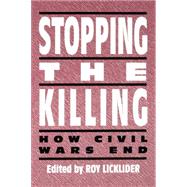
Note: Supplemental materials are not guaranteed with Rental or Used book purchases.
Purchase Benefits
What is included with this book?
| Acknowledgments | |
| How Civil Wars End: Questions and Methods | p. 3 |
| The Unfinished Agenda: Negotiating Internal Conflicts | p. 20 |
| Civil Violence and Conflict Resolution: The Case of Colombia | p. 37 |
| The Peace Process in the Sudan, 1971-1972 | p. 63 |
| The Civil War in Yemen, 1962-1970 | p. 95 |
| The End of the Zimbabwean Civil War | p. 125 |
| The End of the American Civil War | p. 164 |
| The Ending of the Nigerian Civil War: Victory, Defeat, and the Changing of Coalitions | p. 189 |
| The Doomed Revolution: Communist Insurgency in Postwar Greece | p. 205 |
| The Causes of Peace | p. 235 |
| When War Doesn't Work: Understanding the Relationship between the Battlefield and the Negotiating Table | p. 269 |
| Political Order and the "Settlement" of Civil Wars | p. 292 |
| What Have We Learned and Where Do We Go from Here? | p. 303 |
| Bibliography | p. 323 |
| Contributors | p. 341 |
| Index | p. 343 |
| Table of Contents provided by Blackwell. All Rights Reserved. |
The New copy of this book will include any supplemental materials advertised. Please check the title of the book to determine if it should include any access cards, study guides, lab manuals, CDs, etc.
The Used, Rental and eBook copies of this book are not guaranteed to include any supplemental materials. Typically, only the book itself is included. This is true even if the title states it includes any access cards, study guides, lab manuals, CDs, etc.